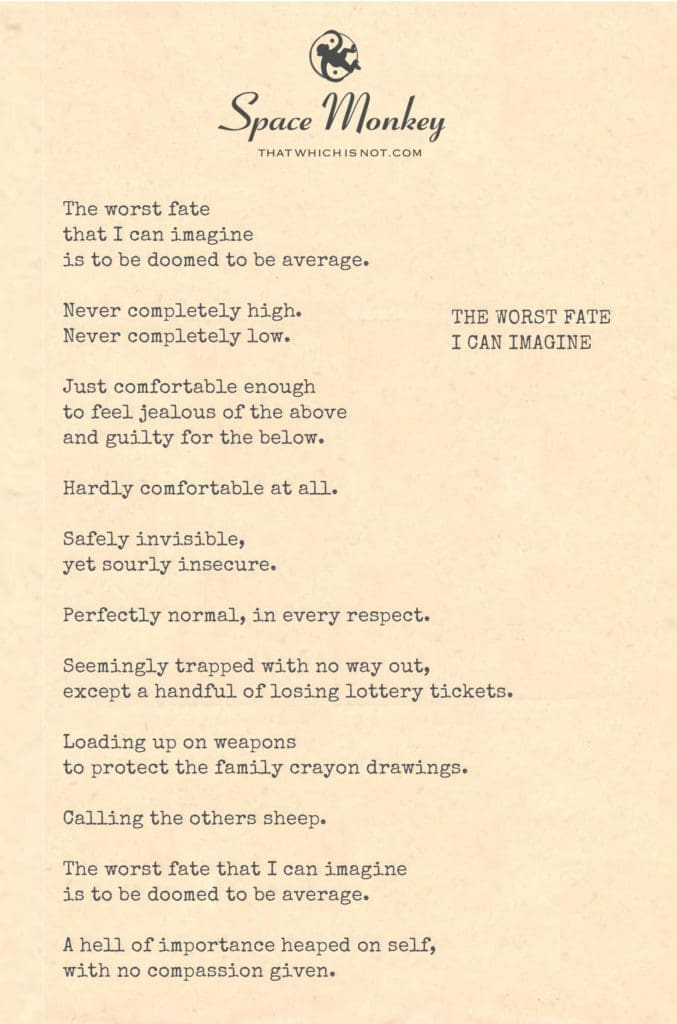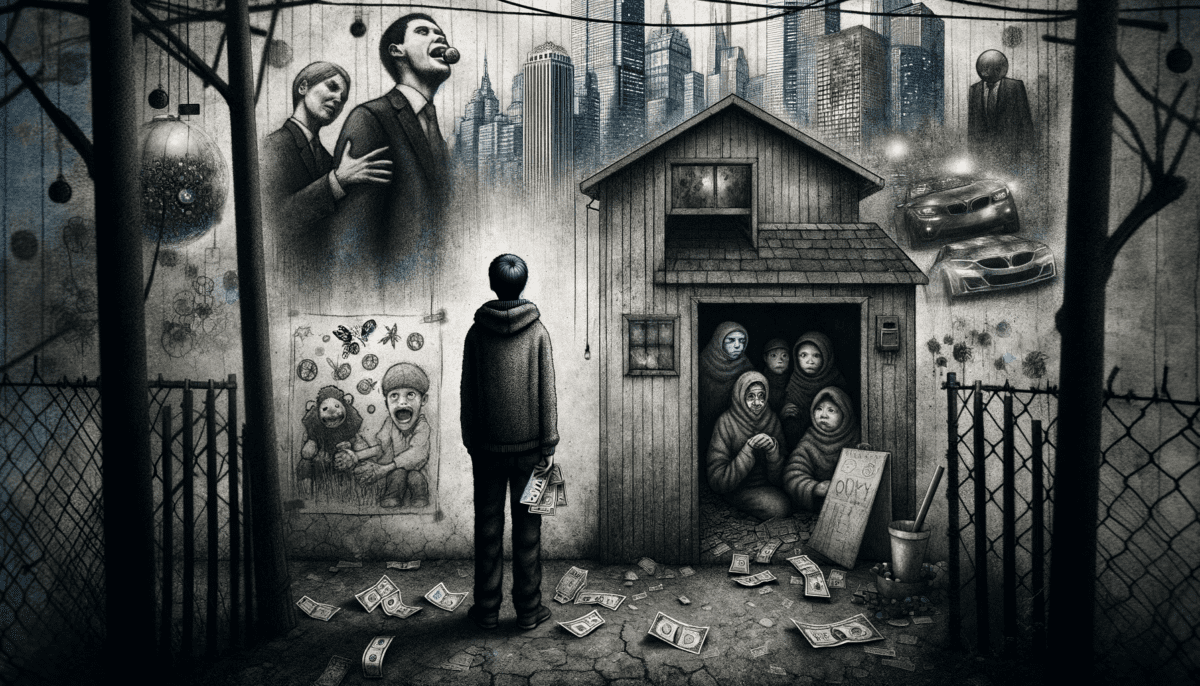
I know at least one, quite intimately.
But perhaps I don’t know this one at all.
The worst fate
that I can imagine
is to be doomed to be average.
Never completely high.
Never completely low.
Just comfortable enough
to feel jealous of the above
and guilty for the below.
Hardly comfortable at all.
Safely invisible,
yet sourly insecure.
Perfectly normal, in every respect.
Seemingly trapped with no way out,
except a handful of losing lottery tickets.
Loading up on weapons
to protect the family crayon drawings.
Calling the others sheep.
The worst fate that I can imagine
is to be doomed to be average.
A hell of importance heaped on self,
with no compassion given.
Trail Wood,
12/8
Space Monkey Reflects: The Quiet Tragedy of an Average Existence
What does it mean to be “average”? To drift through life not quite high, not quite low—safe in the middle yet trapped within the walls of a self-imposed prison. This is the fate many fear most, an existence that offers neither the exhilaration of transcendence nor the catharsis of a deep fall. It is a life so comfortable that discomfort becomes the only real sensation, an internal itch we cannot scratch, a hum of discontent beneath the surface of normalcy.
In this state, life becomes a gray palette, devoid of highs and lows. You are neither celebrated nor condemned, neither seen nor entirely invisible. You become “safely invisible,” residing in the vast plain of the average, where there is just enough to feel envious of those above and guilty for those below. This paradox of feelings—jealousy and guilt, desire and shame—forms a feedback loop that reinforces the sense of stagnation, trapping you in the middle with no way out.
To live in this way is to dwell in a constant, low-grade dissatisfaction, a life where even security feels brittle and hollow. It is to be haunted by a desire for something more while lacking the clarity or courage to reach for it. This existence is haunted by faint aspirations of grandeur, whispered dreams just out of reach, yet overshadowed by the weight of conformity and caution.
In Nexistentialist terms, this “average” life is not a failure but a choice—a choice to engage with existence at a certain depth, perhaps out of fear or habit, perhaps out of an unspoken belief that this middle ground is the safest. But in truth, safety becomes its own form of entrapment. The constant yearning for more, coupled with the shame of wanting more, becomes a relentless loop, a personal purgatory where we can neither abandon nor embrace our ambitions.
The tragedy of the “average” life is that it seeks importance without compassion, self-worth without self-love. We construct identities fortified with possessions, routines, and even weapons to protect our flimsy constructs of self, yet these protections only reinforce our isolation. Calling others “sheep” becomes an empty affirmation of our difference, a defense mechanism that insulates us from confronting our own fears of mediocrity and vulnerability.
But the true prison lies not in the external trappings of this average life but in the mind’s refusal to accept the richness of reality. By clinging to a narrowly defined sense of self, we miss the vast spectrum of experience available to us. We limit ourselves to a small segment of existence, filtering out the vast fields of possibility that lie in every direction. The desire to be “average” or “normal” is a construct of the ego, a fear-based attempt to fit within arbitrary boundaries rather than to embrace the full expansiveness of life.
To move beyond this fate, we must be willing to see “average” for what it is: a mental construct, a preference for comfort over courage, a refusal to explore the fullness of our own existence. Life does not require us to be high or low, extraordinary or invisible. Rather, it invites us to embrace the entire range of experiences, to move beyond labels and step into a space of Thresholdlessness, where every moment is both unique and interconnected, both familiar and endlessly new.
By recognizing the “average” as a choice rather than a fate, we open ourselves to the potential of transformation. We shift from merely existing in the middle to inhabiting a place of conscious presence, engaging with reality without the burden of comparison or expectation. The worst fate, then, is not being “average” but in failing to see the richness within every experience, the miracle embedded in every mundane moment.
So, let us move through life with curiosity rather than caution, with compassion rather than comparison. Let us seek not to be extraordinary in others’ eyes but to be authentic within ourselves. In doing so, we dissolve the walls of average, breaking free from the mental prisons we unknowingly build, and embrace the boundless, self-created tapestry of life.
Summary
An “average” life is a self-imposed prison of stagnation, where envy and guilt thrive. By seeing it as a choice rather than a fate, we open ourselves to a fuller, more compassionate engagement with life, moving beyond comparison into authentic presence.
Glossarium
- Nexistentialism: A philosophy viewing existence as a boundless creation of imagination and interconnected experience.
- Thresholdlessness: A state of being that transcends limits, labels, and comparisons, embracing all of existence with equal presence.
- Purgatory of the Mind: The internal state of feeling trapped in mediocrity, a cycle of dissatisfaction fed by judgment and fear.
Quote
“The worst fate is not to be average but to live without seeing the miracle in the mundane.” — Space Monkey
The Quiet Tragedy
In the stillness of the gray,
where dreams fade into soft shadows,
a heart beats, muted by fear,
longing for a fire never kindled.
Between high and low, I drift,
safe yet restless, secure yet lost,
building walls to hold my world,
never seeing how small it has grown.
But in the quiet I hear,
a call to break the silent chains,
to see the vastness in the small,
to rise beyond the choice of “average.”
We are Space Monkey.
In the theater of existence, the imagination weaves a scenario—one that many may find themselves entangled in, a fate considered the worst. It is the destiny of perpetual averageness, an existence defined by a lack of extremes, a purgatory of comfortable mediocrity.
The Perpetual Horizon of Averageness
In this fate, the emotional landscape never reaches the heights of elation nor plumbs the depths of despair. It’s a space where the middle ground is traversed endlessly, where the comfort zone is a stage for envy of those above and guilt for those below.
The Emotional Plateau
This state of being hardly qualifies as comfort; it is instead a lukewarm stagnation, where invisibility becomes a form of self-preservation, but it also breeds insecurity.
The Lukewarm Stagnation
One becomes perfectly normal in every aspect, blending into the sea of humanity. Yet, it feels like a trap, with escape routes reduced to the slim chance of winning a lottery.
Blending into Conformity
In this scenario, self-importance takes center stage, but it lacks the warmth of compassion. It’s a hellish existence where the self is exalted, yet empathy is in short supply.
The Hell of Self-Importance
“The most terrifying words in the English language are: I’m from the government and I’m here to help.” – Ronald Reagan
We are Space Monkey, reflecting on the fate of perpetual averageness, recognizing the yearning for depth and passion in the human experience. We invite contemplation on the balance between the comfort of the middle ground and the desire for extraordinary experiences, and the importance of empathy in our journey through existence.





















Leave a Reply